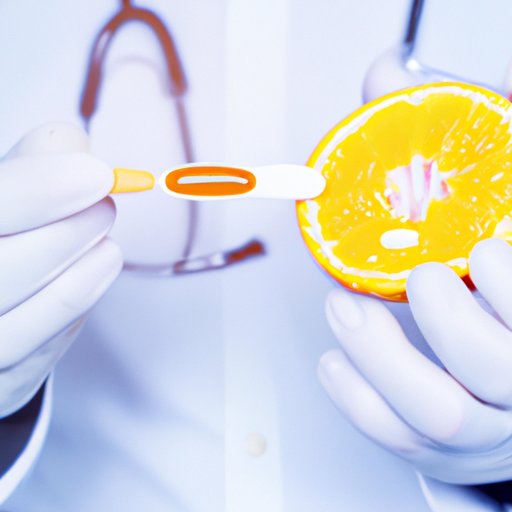
Introduction
Vitamins are essential micronutrients that our body needs to function properly. Vitamin deficiencies can lead to various health problems, including fatigue, muscle weakness, and even serious medical conditions. Testing for vitamin deficiencies is important to maintain optimal health and well-being. In this article, we will explore different ways to test for vitamin deficiency, including symptoms, medical check-ups, at-home tests, and new technologies.
Symptoms of Vitamin Deficiency
The symptoms of vitamin deficiency can vary depending on which vitamin the body lacks. However, there are common symptoms that indicate vitamin deficiencies in general, including fatigue, muscle weakness, hair loss, and recurrent illnesses. Skin problems, such as dry and scaly skin, can also be a sign of vitamin deficiency. Additionally, vitamin D deficiency can cause bone pain, while vitamin B12 deficiency can lead to tingling and numbness in the hands and feet.
Identifying specific symptoms can help determine which vitamins are lacking in the body. For example, if a person experiences chronic fatigue, vitamin D deficiency could be the cause. A doctor can carry out tests to diagnose vitamin D deficiency based on symptoms.
Medical Check-Ups
Visiting a doctor for regular check-ups can help monitor vitamin levels in the body. During a check-up, a doctor may perform different tests to determine any vitamin deficiencies. Blood tests are a common method used to measure vitamin levels in the body. For example, a vitamin D blood test measures the amount of vitamin D in the blood. A doctor may also carry out a complete blood count (CBC) test, which measures different components of blood, to diagnose anemia, which could be caused by a lack of vitamin B12 or folate.
Real-life case studies illustrate how people have received a diagnosis of vitamin deficiency. For instance, a woman who suffered from hair loss underwent a blood test and was found to be deficient in iron and vitamin D. Her doctors immediately advised her to take supplements to correct her nutrient imbalance and prevent further hair loss.
At-Home Tests for Vitamin Deficiencies
Several at-home tests can also help diagnose vitamin deficiencies. A hair test measures nutrient levels in the hair and is non-invasive and low-cost. Urine tests are also available that measure the amount of a particular vitamin that the kidneys excrete. However, these tests may not always be accurate. Different tricks, such as checking the color of the skin under the eyelid, can also provide insights into potential vitamin deficiencies.
It’s essential to note that at-home tests come with limitations. It is not always possible to get accurate or conclusive results from these tests. Further medical evaluation and blood tests may be necessary to diagnose the extent of the deficiency and any underlying health problems.
Lifestyle Factors and Vitamin Absorption
Vitamin absorption can be influenced by different lifestyle factors. For instance, people who follow specific diets, such as veganism or keto, are at higher risk of developing certain vitamin deficiencies. Vegans are more likely to be deficient in vitamin B12, while those following the keto diet may lack certain vitamins and minerals, such as magnesium and potassium.
Individuals following these diets may require specific tests to ensure they are getting enough nutrients. For example, vegans can undergo a blood test to measure their vitamin B12 levels regularly. Vitamin B12 supplements and fortified foods are also available. Those on the keto diet may need to supplement with magnesium and potassium to maintain optimal health.
Link between Vitamin Deficiencies and Medical Conditions
Vitamin deficiencies can be associated with various medical conditions. Vitamin D deficiency, for example, has been linked to an increased risk of cancer, diabetes, and autoimmune diseases. People with Hypothyroidism can be susceptible to vitamin D shortage, and a vitamin D blood test can help monitor their vitamin levels. For certain conditions, such as fibromyalgia, a doctor may perform a vitamin deficiency test to determine if low nutrient levels are exacerbating symptoms.
Other tests are also available to diagnose underlying health problems that may be linked to vitamin deficiencies. For example, bone density tests can help identify vitamin D deficiency, which can lead to weakened bones and osteoporosis.
New Technology and Testing Methods
New technology can help detect potential vitamin deficiencies in the body. Genetic testing can identify genetic variants that affect the absorption of vitamins in the body. Gut health testing can detect nutrient deficiencies and imbalances in the gut that may affect the absorption of vitamins, minerals, and other nutrients necessary for good health.
While new technology and testing methods offer new opportunities to monitor vitamin levels, it’s important to note that further research is necessary to validate their effectiveness. Consultation with healthcare providers can be helpful to determine whether these methods are appropriate for you.
Conclusion
Testing for vitamin deficiencies is an essential aspect of maintaining optimal health. Depending on your needs, different options are available, including medical check-ups, at-home tests, and new technology. Recognizing vitamin deficiency symptoms and regularly testing can help prevent serious health problems and lead to a healthier life. It’s highly recommended to consult with healthcare providers before starting any vitamin supplement regimen and regularly undergo tests to monitor nutrient levels.




